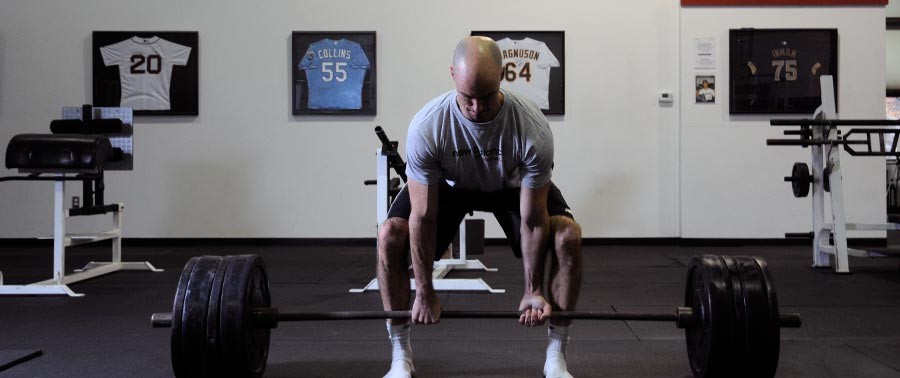Today’s guest post comes courtesy of UK based strength coach, Chris Kershaw, and lands on a theme I am a huge proponent of…
…Jennifer Lopez, Jason Bourne fight scenes, kitty cuddles people “should’ing” all over themselves.
- I “should” life x amount of weight.
- I “should” train x number of days per week.
- I “should” workout despite being injured.
All of these so-called rules are made-up BS and nothing more than stories we tell ourselves. You may find that you fall prey to this line of thinking.
If so, read on…

How Macho Bull and the Word “Should” Can Hold Back Your Training
For the last six months, I’ve been trying to build my squat back up to my previous numbers prior to the pandemic. Not surprisingly, I got a little inside my head and decided I “should” add weight to the barbell every…single…week.
The result of this 100% made up “should” rule resulted in a steady escalation of a pesky back injury every six weeks.
Times were sucky.
Needlessly adhering to silly, arbitrary rules hurt me.
Why Is It Important to Manage Our Relationship With These Rules?
When our mental health becomes defined by our performance in the gym you risk everything blowing up and our head space becomes tethered to whether or not we have a bad session or two.
Good session (hit our numbers) = Everything is hunky dory. Don’t worry babe, I’ll make dinner and wash the dishes tonight.
Bad session (miss our numbers) =
So the solution is you need to get better forever, yes?
No!
We are all getting older. One day, our performance will decline.
If you are defined by your gym performance, you will eventually run into problems.
Having an awareness of the “should” rules will hopefully keep you on the side of positive unconditional regard most of the time and help you to avoid dips in mental health relating to your training.
Another benefit to understanding your relationship with these “should” rules is better decision-making in training.
If you make better decisions, your training will be less self-sabotaging.
It’s not the answer to all your training woes, but it might allow you to train longer without injury, to be able to do your rehab without much resentment, and/or get you to the gym a few more times a year.
In short, staying cognizant of these “should” rules will give you the ability to perform poorly in the gym, to be unhappy about it, but still be able to turn the page, chill out, and accept yourself as being okay.
“Should” Rules That Aren’t Actually Rules
I should….
1. Lift More Weight Every Week
Macho bullshit.
You can’t lift more every week. You’re not He-Man (or She-Ra).
Most of the time, you’ll lift the same weight or less.
If you train regularly with a solid plan, your numbers will go up eventually. If you try to force the numbers up every week then you’ll likely end up frustrated and hurt.
Note From TG: I couldn’t agree more. I often call this expectation management, and it’s something I have to consistently remind my clients of. Like I always say…easy training is good training.
2. Lift More in Competition Than in the Gym
Some people lift more in the gym than in competition, others don’t. You need to compete a few times before you decide you are going to go for a massive PR in competition.
3. I Shouldn’t Get Injured
You’re not Wolverine.
Injuries are part of this journey.
The idea you’ll never get injured is a misguided idea.
You should do everything in your power to have good recovery, and to limit the risk of injury as much as you can, but it isn’t always possible.
4. Deadlift More Than I Squat
Not necessarily.
Josh Greenfield, (a world-record squatter) has a much bigger squat than his deadlift.
My squat and deadlift are around the same, and that is the case for many athletes around the world.
The difference between the two is decided by many factors, most of which are out of your control. Build great technique in them both, program them correctly, go at each lift with the same attitude, and see how they progress.
5. Front Squat
Unless you are training for a particular sport using a particular movement, you don’t need to do that movement if it’s causing you problems.
After a few weeks of front squatting, my knees want to explode.
What does this mean?
It means I don’t front squat often in favour of safety bar squats, goblet squats, or leg presses.
Trying to include a movement in your plan because you “should” is misguided. Quit banging your head against a movement that is hurting you.
6. Low Bar Squat
“LOW BAR SQUAT OR NOTHING!”
-Low bar squat extremist.
If your low bar squat sucks, and you keep hurting yourself then stop low bar squatting.
Find a squat variation you DO get on with.
7. Sumo Deadlift
If sumo deadlifts ruin your hips then the chances are sumo deadlifts don’t work for you. Don’t worry, you will be able to find a deadlift variation optimal for you.

The same goes for any other deadlift variation people say you “should” do.
If it hurts you consistently and your form looks good, switch it up. Maybe rack pulls or block deadlifts work better for you. That’s ok.
8. Max Out EVERY SESSION
Yes, you should, if you want to: 1) get injured 2) make training so mentally exhausting that you’ll burn out in 4 seconds.
This is macho bullshit hampering your training.
To make maxing out effective, you have to pick your battles. When you are in a competition is a great time to max-out.
When it’s something you do because it’s a Tuesday (or something equally as random and there’s no planning involved) you’re setting yourself up for trouble.
I like having my clients max-out infrequently as it’s hard to recover from and it’s risky.
I’d much rather a lifter got stronger while keeping some effort in the tank for another day unless they are competing.
9. Take Pre-Workout Before Every Session
Pre-workout supplements, when used diligently can work effectively.
When used perpetually to fuel sessions, we often see issues with anxiety, motivation, and other issues because of the knock-on effects on recovery.
Too-much pre-workout makes people need to de-load more often and makes stupid decisions in training more likely.
My personal strategy is to have a black coffee or sugar-free energy drink before training rather than a specific pre-workout supplement.
10. Be Able to Train Hard All the Time
Life happens, we don’t sleep sometimes, we get injured, and we get ill.
Sometimes, you will train poorly, and the cold truth of it all is most sessions are going to be average.
Some sessions will be awful.
Sometimes bad sessions come out of the blue, other times it’s after doing something you wouldn’t usually do.
Often it’s due to things completely out of your control. Which means bad sessions are unavoidable.
You have to be able to cope with that if you are to succeed in making training a long-term habit.
11. Train “x” Amount of Times Per Week
Based on over a decade of working with people like you, can you guess what training frequency tends to work best for people?
- 6 times a week?
- 5 times?
The answer is 3-4 sessions of 30-90 minutes.

For most, trying to train more than this is wildly optimistic.
If your favourite athlete trains 18 times a week it doesn’t mean you should.
Typically when people with lives end up training hard more than four times per week they end up under-recovered and over-injured.
For most people, I’d encourage you to train 3-4 times per week with various non-gym walks/steady cardio sessions dispersed throughout the week, with a little bit of HIT training .
12. Train Through Injury or Illness
You can safely train around an injury with careful exercise selection, and the correct application of rehab work.
Expecting to push through a program without factoring in your injury is macho bullshit.
When injury strikes you have to adapt to the circumstances, not steamroll ahead without changing course. The course correction may only need to be small, but a change of course will be needed to accommodate an injury.
With illness, there are times when you have to train, especially with chronic illness.
But with cold, flu, coronavirus, or whatever other short-term illness you have you to rest 1) so you don’t spread it to others and 2) so you don’t end up more unwell.
Conclusion
Good training is built upon hundreds of good decisions. Trying to adhere to rules because you “should” derails those decisions and makes it more likely you will make bad decisions and mess up your training.
When you begin training, many of these bad decisions will crop up.
By avoiding these bad decisions and rules that aren’t rules, your training is likely to be more consistent, more productive, and less stressful.
This is a good thing.
About the Author
Chris Kershaw is a certified personal trainer located in Leeds, England.
Known as The Heavy Metal Strength Coach, Chris aims to show as many people as possible that consistently lifting weights and working with a coach “isn’t that bad.”
He works with clients to improve their lives via the medium of the barbell (and the occasional kettlebell.)




